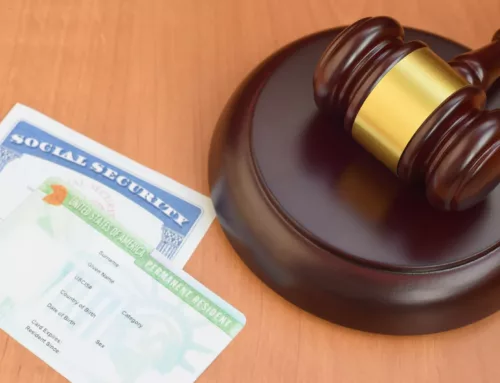How much SSDI can I anticipate in 2021?
If you have been injured or become ill and cannot work, you may be eager to get financial assistance to help you support yourself both now and in the future. For individuals who cannot work due to a condition, Social Security Disability Payments are often the best choice. A Ridgeland social security disability attorney familiar with the Social Security Administration’s regulations and procedures may assist you in obtaining the benefits to which you are entitled.
- Is SSDI available to me?
- How much can I make through SSDI?
- Seek advice from a Social Security lawyer
Is SSDI available to me?
When applying for disability payments, you must demonstrate to the government that you are a handicapped person who has reached the stage when your condition prevents you from working. Always remember that just because you are receiving disability payments does not imply that you are unable to work or that you should refrain from working for the time being.
Workers who have accrued a sufficient number of work credits are eligible for Social Security Disability Insurance benefits (SSDI). SSDI beneficiaries are deemed “insured” by the government since they paid FICA Social Security taxes while receiving SSDI benefits.
A worker must collect a specific number of taxable labor credits to be eligible for social security benefits.
Benefits under the Social Security Disability Insurance (SSDI) program are provided to disabled children, widows and widowers, and disabled workers under the age of 65 who are not yet retired.
What can I do to retain SSDI?
These are somewhat different from SSDI to SSI. Substantial gainful activity is not considered in most income types that are not derived directly from wages for Social Security Disability Insurance. This covers investments, a spouse’s income, interest, and other assets, among other things.
How much can I receive through SSDI?
One of the many decisions you’ll have to make before filing for Social Security Disability Insurance (SSDI) benefits is whether disability payments alone will be sufficient financial support for you. Disability payments alone may not be enough. As of 2021, the maximum amount of monthly disability compensation you may get is $3,148 per month. On the other hand, the average monthly benefit will be more in the neighborhood of $1,277 per month.
It has been estimated by the Social Security Administration (SSA) that the maximum amount of wages subject to Old Age, Survivors, and Disability Insurance (OASDI) tax would increase to $142,800 in 2021 from $137,700 in 2020.
Among other things, the Social Security Administration (SSA) announced that recipients of Social Security benefits would receive a 1.3 percent cost of living adjustment beginning in 2020. The earnings test for the amount of income that beneficiaries can receive without reducing their benefits each year is $18,960 before full retirement age. The limit taxpayers can earn once they reach full retirement age is $50,520.
Factors affecting the SSDI income limit
Because SSDI is a needs-based program, applicants can anticipate having a lower income and fewer assets than is typical for their age group. For 2020, the FBR was $783 for each disabled individual and $1,175 for a pair of disabled people or a married couple.
If a person’s countable income is less than the FBR, their SSDI payments will be lowered by the amount of the person’s countable income. If an SSDI applicant does not have a taxable source of income but is otherwise eligible, they will get the monthly FBR.
Because SSDI is a need-based program, a person’s assets and income are highly considered when deciding whether or not they are eligible. Before approving an adult for SSI payments, their assets and other financial resources will be evaluated. These may include:
- Assets and cash passed down through the generations
- Earnings from a financial investment
- Putting money aside for retirement
- Friends and family members may provide a hand.
- Anything else that is monetary, such as cars, houses, and commercial rental properties
If you just own one home or one vehicle, the value of such possessions is unlikely to be taken into account in an SSDI assessment. The likelihood of having your assessment prolonged is greater if you have ownership over more than one vehicle or house.
Living with relatives or friends and not paying rent, on the other hand, may affect your SSDI eligibility. If your spouse is also receiving SSDI payments, you will get a joint SSDI benefit as well. This occurs every year as a result of rising costs of living (COLA).
When a minor applies for Social Security Disability Insurance, the Social Security Administration is likely to look at the child’s and parent’s income and financial resources. These include the salaries of the parents, as well as any of the following:
- Support for the child
- Pensions
- Returns on investment
- Alimony
How to Stop Receiving SSDI Benefits
The Social Security Administration typically terminates SSDI payments because the recipient has returned to work, although this is not always the case. Returning to your regular job while receiving SSDI benefits will be deemed “substantial gainful activity” by the Social Security Administration (SGA).
Pay is the most critical factor in evaluating whether or not employment is SGA. In 2020, earning more than $1,260 per month or $2,110 per month for the blind is considered SGA.
In the case of part-time employment, earning $200 per week does not constitute an excess of the SGA limit. If you put in many hours but earn less than the SGA level, they may terminate your SSDI benefits.
In cases where you are employed and earn more than the SGA, you may be eligible for a short-term disability benefit plan. SSDI beneficiaries are given a grace period during which they may return to work without losing their benefits.
You will be able to work for nine months at max during a trial work period while still receiving SSDI disability benefits, regardless of how much money you make during that time. As soon as the trial work period is over and you continue to earn more than the SGA level, the local social security office may determine that you are no longer with disability and terminate your Social Security Disability payments.
Some of the reasons why your SSDI payments may be terminated are as follows:
- You’ve reached the age of 66 and are no longer eligible for SSDI but are instead eligible for Social Security retirement payments.
- Following 30 days in prison, your SSDI payments will be terminated, and your benefits will only be available for one month following your release from jail. If you are enrolled in a rehabilitation program, you may get a different level of care. It is dependent on the nature of the offense. A minor conviction may have an impact on your SSDI benefits, but only if you are sentenced to one month or more in prison.
- If your parents are receiving SSDI benefits and you are under 18, your SSDI payments may be terminated when you reach the age of maturity in Mississippi.
Seek advice from a Social Security lawyer
If you’re thinking about applying for SSDI benefits while still working, or if you’ve been receiving social security retirement benefits but want to supplement your income with part-time work, you must get all the facts before making any decisions that could jeopardize your disability appeal and payments.
Consider contacting a social security disability attorney in Ridgeland for help with filing for Social Security benefits, appealing a decision, or just discussing any legal problem.
Our friendly legal team will schedule a free consultation to review your case and explain how SSDI income limitations may impact you. Call us at 601-202-5101 or send us an email using our safe contact form.








Connect with Us